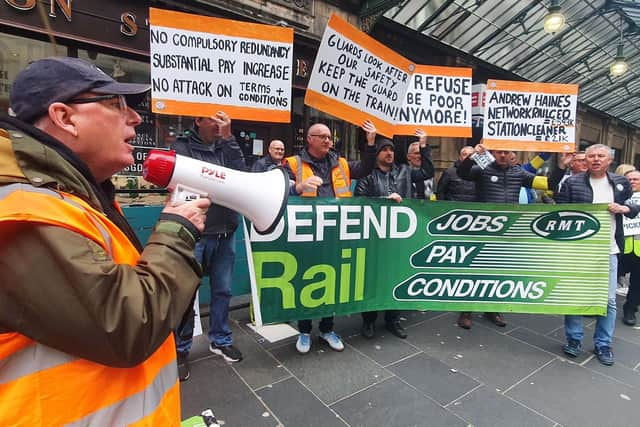Network Rail workers November rail strikes: New dates and reason for industrial action
and live on Freeview channel 276
Further days of industrial action are set to take off this week in the latest wave of a long-standing dispute between the union and Network Rail over unresolved pay, job security, and working conditions, potentially disrupting millions of journeys as the country heads into winter.
Members of the Rail, Maritime, and Transport Union (RMT) said they will walk out due to the conflicts on November 5, 7, and 9 instead of striking on November 3 as previously planned to avoid a clash with the London Poppy Day appeal of the Royal British Legion, reported The Telegraph. London Overground and London Underground RMT members will also go on strike on November 10, which was originally scheduled for November 3.
Advertisement
Hide AdAdvertisement
Hide AdOn November 4, 7, and 8, additional union members representing workers in ticket booths, stations, control rooms, and support roles who are employed by specific railroad corporations will engage in strikes and non-strikes.
The union has accused Network Rail of aiming to impose "dramatic changes" in working conditions on its employees and is concerned about the company’s practice of contacting workers directly, which, according to the union, undermines "sensitive conversations."
RMT general secretary Mick Lynch said previously: “The dishonesty of Network Rail bosses has reached a new low in this national rail dispute. On the one hand, they were telling our negotiators that they were prepared to do a deal while planning to torpedo negotiations by imposing unacceptable changes to our members’ terms and conditions. Our members are livid with these duplicitous tactics, and they will now respond in kind with sustained strike action.”
New dates of RMT rail strikes
Strikes will be held in November on Friday, (November 4), Saturday, (November 5), Monday, (November 7), Tuesday, (November 8), and Wednesday, (November 9). One out of every five trains is likely to run, leaving significant portions of the UK without any rail service at all.
Advertisement
Hide AdAdvertisement
Hide AdEarly trains will be affected the day after each strike, with approximately 75% of services likely to be operating on non-strike days. Since many people who had wanted to travel on strike-affected days will be looking to reschedule their travel, they are probably going to be busier than usual.
Services affected by the rail strikes
The 14 train operating companies we are taking strike action on are as follows:
- Chiltern Railways
- Cross Country Trains
- Greater Anglia
- LNER
- East Midlands Railway
- c2c
- Great Western
- Railway
- Northern Trains
- South Eastern
- South Western Railway
- Transpennine Express
- Avanti West Coast
- West Midlands Trains
- GTR (including Gatwick Express)


Who is involved in the pay dispute?
There are dozens of individual disputes involving several employers. They are Network Rail – the infrastructure provider, running the tracks, signalling and some large stations – and more than a dozen train operators, who are contracted by the Department for Transport (DfT) to run a specified schedule of services.
There are four unions who are involved in the ongoing negotiations. They are, RMT, the main rail union, Aslef, representing train drivers, Transport Salaried Staffs’ Association (TSSA), the union for white-collar staff in the transport industry and Unite, representing some grades in some train operators.
Comment Guidelines
National World encourages reader discussion on our stories. User feedback, insights and back-and-forth exchanges add a rich layer of context to reporting. Please review our Community Guidelines before commenting.
